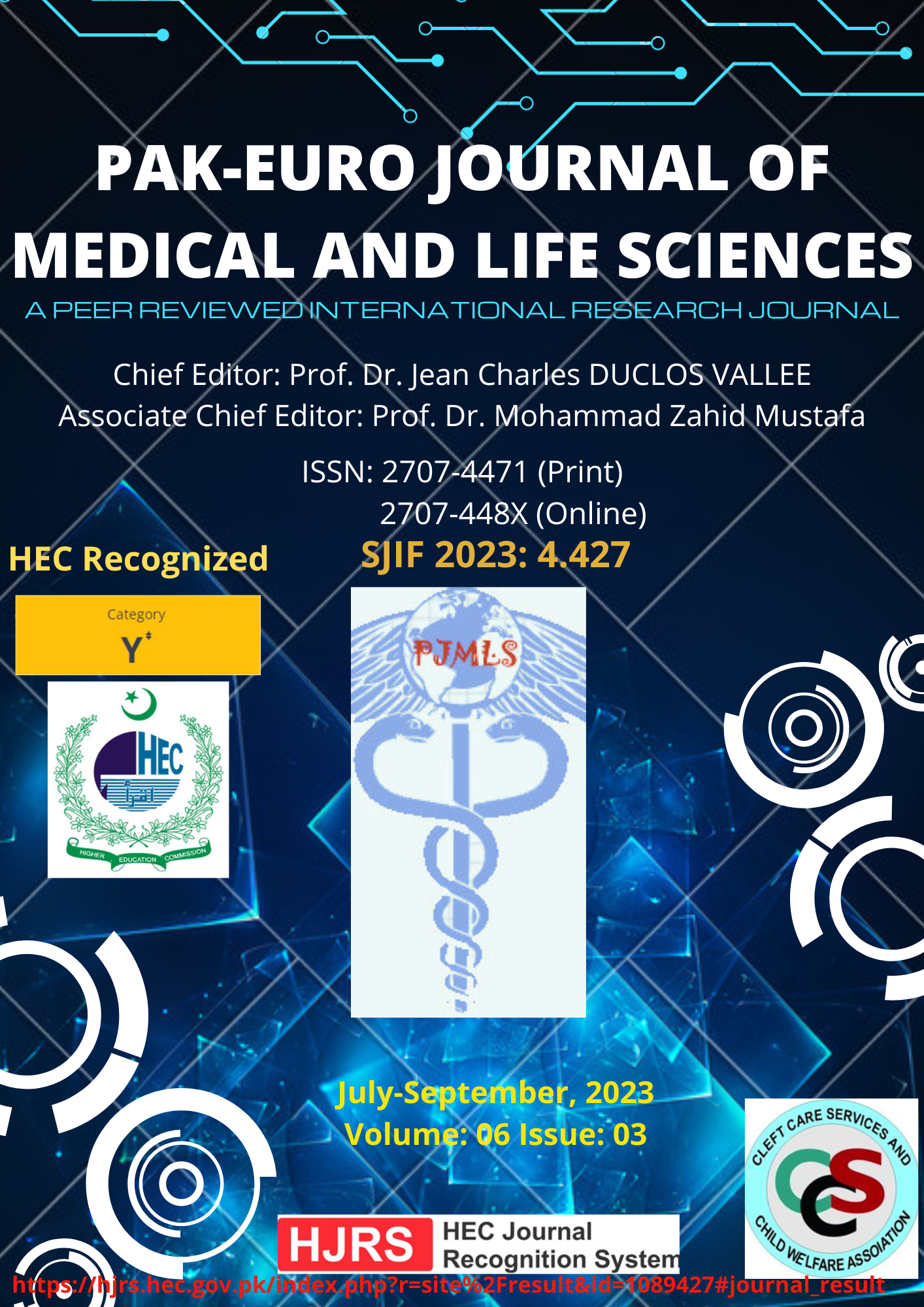Strategic Resilience: Pakistan’s Comprehensive Approach towards Combatting and Adapting to the Challenges of Covid-19
DOI:
https://doi.org/10.31580/fzfs0v92Keywords:
Corona, Covid-19, strategist approach, Pakistan, vaccine, Preventive measureAbstract
The global consequences of COVID-19 extend beyond borders, race, and ethnicity, posing significant health challenges universally. While all countries grappled with the pandemic, underdeveloped nations faced heightened risks due to constrained financial and health infrastructure. The ongoing crisis has unpredictably tested societies, imperiling humanity, and global resilience. This situational analysis, conducted by the authors, involved data collection from the World Health Organization’s COVID-19 website and Pakistan’s Directorate of Central Health Establishments between February 2020 to March 2022. The study also encompassed a thorough review of recent articles, literature, news alerts, and publicly available data on COVID-19 in Pakistan. In response to the pandemic, Pakistan devised a comprehensive strategy, featuring a national action plan, the establishment of the national 1166 helpline, thermal screening, and active case finding at entry points, and the reinforcement of a surveillance system for contact tracing and case-based monitoring. This crisis has significantly impacted the mental health of healthcare workers and disrupted education, particularly in rural areas. Despite these challenges, a positive environmental outcome emerged as air quality improved during the lockdown.
References
Ciotti M, Ciccozzi M, Terrinoni A, Jiang W-C, Wang C-B, Bernardini S. The COVID-19 pandemic. Critical reviews in clinical laboratory sciences. 2020;57(6):365-88.
Yuki K, Fujiogi M, Koutsogiannaki S. COVID-19 pathophysiology: A review. Clinical immunology. 2020;215:108427.
WHO. Coronavirus disease (Covid-19); Naming the coronavirus disease (COVID-19) and the virus that causes it. https://www.who.int/emergencies/diseases/novel-coronavirus-2019/technical-guidance/naming-the-coronavirus-disease-(covid-2019)-and-the-virus-that-causes-it.
Farooq F, Khan J, Khan MUG. Effect of Lockdown on the spread of COVID-19 in Pakistan. arXiv preprint arXiv:200509422. 2020.
Yuki K, Fujiogi M, Koutsogiannaki S. COVID-19 pathophysiology: A review 2020 :108427.
A.Waris UKA. COVID-19 outbreak: current scenario of Pakistan. 2020.
Abid K BY, Younas M. Progress of COVID-19 Epidemic in Pakistan. May 2020.
WHO W. WHO dashboard. https://covid19.who.int/region/emro/country/pk.
Hayat K, Rosenthal M, Xu S, Arshed M, Li P, Zhai P, et al. View of Pakistani residents toward coronavirus disease (COVID-19) during a rapid outbreak: a rapid online survey. International journal of environmental research and public health. 2020;17(10):3347.
Sohil F, Sohail MU, Shabbir J. COVID-19 in Pakistan: Challenges and priorities. Cogent Medicine. 2021;8(1):1966179.
Khalid A, Ali S. COVID-19 and its Challenges for the Healthcare System in Pakistan. Asian bioethics review. 2020;12(4):551-64.
Rizwan A, Naveed S, Salman Y. An analysis of policies, challenges, and outcomes in Pakistan through co-creation of COVID-19 responses. Public Administration and Policy. 2023;26(1):107-19.
Akram MA. COVID-19 pandemic and government policies to control its situation in Pakistan. Acta Scientific Microbiology. 2020;3(6):164-70.
Khan S, Mujaddad M, Uddin MN, Ullah S, Rasheed A, Jatoi NA. Strategies adopted by the Government of Pakistan to cope with the pandemic and comparative cases of COVID-19 in all provinces of Pakistan. 2020.
Nawaz A, Khan MS, Wajid M, Zaman M, Mahmood MI, Shafi MT. COVID-19 and early responses of Pakistan to mitigate the pandemic: A quick. 2022.
Abbas J, Wang D, Su Z, Ziapour A. The role of social media in the advent of COVID-19 pandemic: crisis management, mental health challenges and implications. Risk management and healthcare policy. 2021;14:1917.
Rubab S, Bahadur S, Shuaib M, Rauf A, Zeb A, Shah I, et al. Bioscience Research.
Akram J, Meo SA. Pakistan's role in the COVID-19 pandemic. Biomedica. 2020;36(2S):1-4.
Naz H, Siddiqui M, Khaliq SA. Attitude and Awareness of Pakistani Population Towards COVID-19 Vaccination. RADS Journal of Pharmacy and Pharmaceutical Sciences. 2021;9(4):261-4.
CDC. Cleaning and disinfection for households. 2020 [Available from: https://www.cdc.gov/coronavirus/2019-ncov/prevent-getting-sick/disinfecting-your-home.html?CDC_AA_refVal=https%3A%2F%2Fwww.cdc.gov%2Fcoronavirus%2F2019-ncov%2Fprevent-getting-sick%2Fcleaning-disinfection.html.
Felsenstein S, Herbert JA, McNamara PS, Hedrich CM. COVID-19: Immunology and treatment options. Clinical immunology. 2020;215:108448.
Cunningham AC, Goh HP, Koh D. Treatment of COVID-19: old tricks for new challenges. Springer; 2020: 1-2.
Zhai P, Ding Y, Wu X, Long J, Zhong Y, Li Y. The epidemiology, diagnosis and treatment of COVID-19. International journal of antimicrobial agents. 2020;55(5):105955.
Khan N, Naushad M, Akbar A, Faisal S, Fahad S. Critical review of COVID-2019 in Pakistan and its impact on Pakistan's economy. Available at SSRN 3629718. 2020.
Salik AN, Rafique N. Impact of COVID-19 on Economy of Pakistan. Institute of Strategic Studies. 2020:1-3.
Aftab R, Naveed M, Hanif S. An analysis of COVID-19 implications for SMEs in Pakistan. Journal of Chinese Economic and Foreign Trade Studies. 2021.
Zhan JX. COVID-19 and investment--a UNCTAD research round-up of the international pandemic's effect on FDI flows and policy. Transnational corporations. 2020;27(1):1-3.
Geven K, Hasan A. Learning losses in Pakistan due to COVID-19 school closures. 2020.
Rasheed R, Rizwan A, Javed H, Sharif F, Zaidi A. Socio-economic and environmental impacts of COVID-19 pandemic in Pakistan—an integrated analysis. Environmental Science and Pollution Research. 2021;28:19926-43.
khan Ra. Challenges to online education in Pakistan during COVID-19 & the way forward. Social Science Learning Education Journal, 6(07), 503-512. 2021.
EPA. Abstract book 2019-2020. https://2020.epa-congress.org/abstract-book-2019/.
Rasheed R, Rizwan A, Javed H, Sharif F, Zaidi A. Socio-economic and environmental impacts of COVID-19 pandemic in Pakistan—an integrated analysis. Environmental Science and Pollution Research. 2021;28(16):19926-43.
Mak IWC, Chu CM, Pan PC, Yiu MGC, Chan VL. Long-term psychiatric morbidities among SARS survivors. General hospital psychiatry. 2009;31(4):318-26.
Raza A, Matloob S, Abdul Rahim NF, Abdul Halim H, Khattak A, Ahmed NH. Factors impeding health-care professionals to effectively treat coronavirus disease 2019 patients in Pakistan: A qualitative investigation. Frontiers in psychology. 2020;11:572450.
Rana W, Mukhtar S, Mukhtar S. Mental health of medical workers in Pakistan during the pandemic COVID-19 outbreak. Asian journal of psychiatry. 2020;51:102080.
Mahmood QK, Jafree SR, Jalil A, Nadir SMH, Fischer F. Anxiety amongst physicians during COVID-19: cross-sectional study in Pakistan. BMC Public Health. 2021;21(1):1-10.
Hayat K, Arshed M, Fiaz I, Afreen U, Khan FU, Khan TA. Impact of COVID-19 on the mental health of healthcare workers: a cross-sectional study from Pakistan. Frontiers in Public Health. 2021;9:603602.
Downloads
Published
Issue
Section
License
Copyright (c) 2023 Pak-Euro Journal of Medical and Life Sciences

This work is licensed under a Creative Commons Attribution 4.0 International License.






